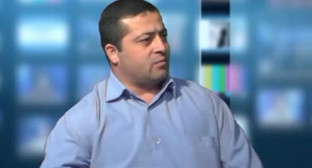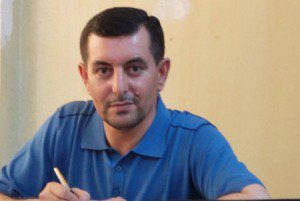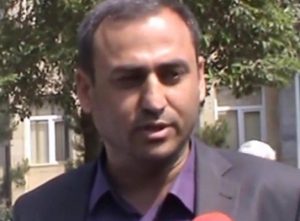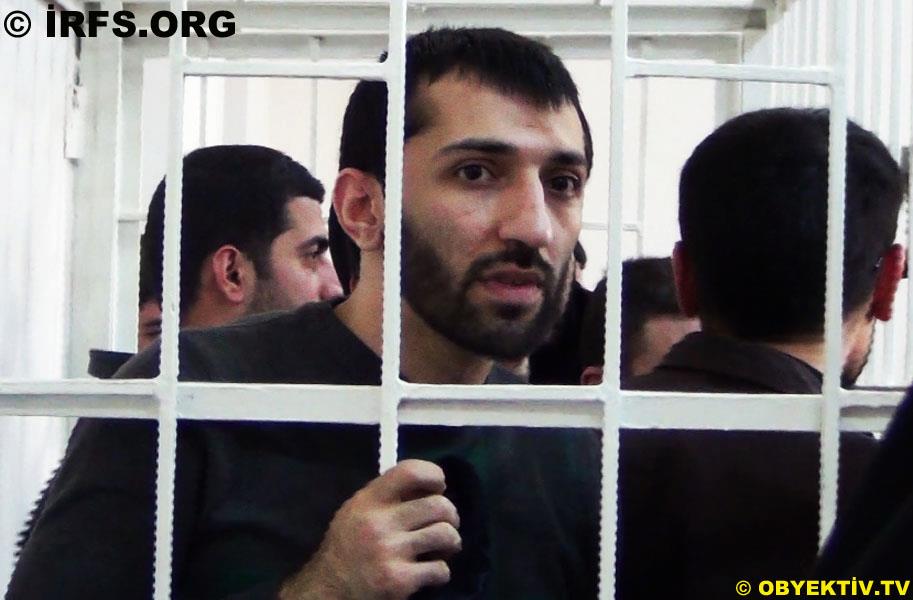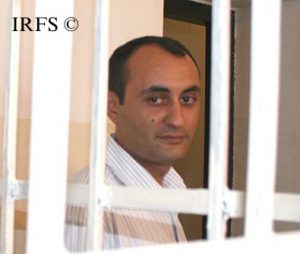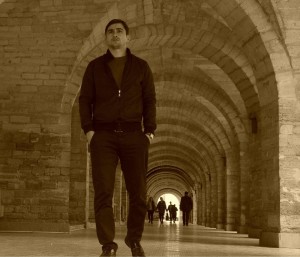22 May 2017 | Azerbaijan, Azerbaijan Statements, Campaigns -- Featured, Digital Freedom, Europe and Central Asia, Statements
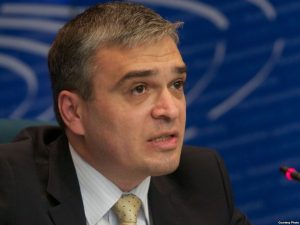
Ilgar Mammadov
Today three years have passed since the European Court of Human Rights (ECtHR) delivered its judgment on the case of political prisoner Ilgar Mammadov, concluding that the Azerbaijani authorities had detained him to punish him for his criticism of the government. In spite of this ruling, and repeated calls for his release by Council of Europe bodies in follow-up to the ruling, the Azerbaijani authorities have persistently refused to execute the decision of the Court and free Ilgar Mammadov. In view of this, we, members of the Civic Solidarity Platform and the Sports for Rights Coalition, call on the Committee of Ministers of the Council of Europe to refer the case back to the ECtHR on the grounds of non-execution of the judgment. This is crucial to ensure justice for this wrongly imprisoned government critic, who has already spent more than four years behind bars, as well as to safeguard the legitimacy of the Council of Europe as the guardian of human rights and the rule of law in the region.
Ilgar Mammadov, chair of the political opposition REAL party, was a well-known opponent of the regime when he was arbitrarily detained in February 2013. He attempted to stand in the 2013 presidential elections, gathering the required 40 000 signatures in support of his candidacy, which the Central Election Commission ruled as invalid.[i] He was also outspoken in his criticism of the policies of the authorities on his blog and in the media. Ilgar Mammadov was detained after monitoring and reporting on street protests in the town of Ismayilli in January 2013, which resulted in clashes with the police. He did not participate in these protests, but travelled to the region after they took place to observe developments and revealed the role of individuals with ties to the authorities in initiating the clashes. In spite of the lack of evidence llgar Mammadov was accused of instigating the Ismayilli clashes and on 17 March 2014, he was sentenced to seven years in prison on trumped-up charges of “organizing mass riots” and using “violence against police officers”. His sentence was upheld on appeal.
In a judgment issued on 22 May 2014, the ECtHR found that Ilgar Mammadov’s arrest and detention violated numerous provisions of the European Convention on Human Rights, including Articles 5.1, 5.4 and 6.2 on the right to liberty and security, the right to judicial review of one’s detention and the principle of presumption of innocence, as well as article 18 that limits the applicability of restrictions on rights. The Court concluded that Ilgar Mammadov had been detained without any evidence to reasonably suspect him of having committed a crime and that the actual purpose of his detention was to silence and punish him for criticizing the government and publishing information it was trying to hide.[ii]
In its follow-up to the ECtHR’s ruling, the Committee of Ministers of the Council of Europe — the body responsible for supervising the execution of ECtHR judgements — has repeatedly called on the Azerbaijani authorities to release Ilgar Mammadov. The Committee has examined this case as a matter of priority in its review of the execution of ECtHR judgments by Council of Europe member states and adopted a number of decisions and interim resolutions on it.[iii]
Other Council of Europe bodies, including the organization’s Secretary General, its Human Rights Commissioner and the President of its Parliamentary Assembly have also repeatedly called for Ilgar Mammadov to be released. However, the Azerbaijani authorities have flagrantly ignored these calls and refused to implement the ECtHR’s judgment and release Mammadov.
In view of the continued failure of the Azerbaijani authorities to implement the ECtHR’s decision on Ilgar Mammadov’s case, the Council of Europe’s Secretary General Thorbjørn Jagland launched an official inquiry into Azerbaijan’s implementation of the European Convention on Human Rights in December 2015.[iv]Under Article 52 of the Convention, the Secretary General may initiate an inquiry into how the domestic law of member states ensures the effective implementation of the Convention. This was the first time that Secretary General Jagland had taken such a measure and his initiative was welcome and important.
However, in November 2016, Azerbaijan’s Supreme Court nevertheless rejected an appeal submitted by Ilgar Mammadov on the basis of the ECtHR ruling and upheld his seven-year prison sentence. Thus, Ilgar Mammadov remains behind bars for no other reason than speaking out critically about those in power. This continued defiance by the Azerbaijani authorities leads us to conclude that further action is urgently required.
Therefore, we call on the Committee of Ministers to refer the case back to the ECtHR under Article 46.1 of the European Convention on Human Rights, which obliges the parties to the Convention to abide by the final judgment of the Court in any case to which they are parties. The Convention authorizes the Committee to take action to this end. Article 46.4 states: “If the Committee of Ministers considers that a High Contracting Party refuses to abide by a final judgment in a case to which it is a party, it may, after serving formal notice on that Party and by decision adopted by a majority vote of two-thirds of the representatives entitled to sit on the committee, refer to the Court the question whether that Party has failed to fulfil its obligation under paragraph 1.”
Ilgar Mammadov v. Azerbaijan has become a test case of the legitimacy of the Council of Europe. When commenting on the Supreme Court’s failure to uphold Azerbaijan’s obligation to execute the ECtHR judgment last year, Secretary General Jagland stated: “Azerbaijan’s flagrant disrespect of the European Convention on Human Rights undermines the entire scope of our cooperation” [and] “affects the 46 Member States of the Council of Europe who have a collective responsibility for the implementation of the Convention”.[v]
By resorting to the ultimate mechanism for addressing non-compliance of judgments set out by the European Convention on Human Rights, the Committee of Ministers can take resolute action to safeguard the Council of Europe’s integrity and ensure that the Azerbaijani authorities finally abide by their obligations under the Convention, implement the ECtHR ruling and free Ilgar Mammadov.
Signed by the following members of the Civic Solidarity Platform and the Sport for Rights Coalition:
1. Association of Ukrainian Human Rights Monitors on Law Enforcement (UMDPL, Ukraine)
2. Barys Zvozskau Belarusian Human Rights House
3. Bir Duino-Kyrgyzstan
4. Bulgarian Helsinki Committee
5. Center for Civil Liberties (Ukraine)
6. Center for Participation and Development (Georgia)
7. Center for Regional Strategic Studies (Azerbaijan)
8. Center for the Development of Democracy and Human Rights (Russia)
9. Civil Rights Defenders (Sweden)
10. Committee Against Torture (Russia)
11. Crude Accountability (USA)
12. Fair Trials (UK)
13. International Federation for Human Rights (FIDH, France)
14. Freedom Files (Poland)
15. Freedom House (USA)
16. Freedom Now (USA)
17. Helsinki Foundation for Human Rights (Poland)
18. Human Rights Center of Azerbaijan
19. Human Rights Club (Azerbaijan)
20. Human Rights Monitoring Institute (Lithuania)
21. Humanrights.ch (Switzerland)
22. IDP Women Association “Consent” (Georgia)
23. Index on Censorship (UK)
24. Institute for Reporters Freedom and Safety (Azerbaijan)
25. Institute Respublica (Ukraine)
26. International Partnership for Human Rights (IPHR, Belgium)
27. Kazakhstan International Bureau for Human Rights and the Rule of Law
28. Kosova Rehabilitation Centre for Torture Victims
29. Libereco – Partnership for Human Rights (Germany)
30. Moscow Helsinki Group (Russia)
31. Netherlands Helsinki Committee
32. Norwegian Helsinki Committee
33. Notabene (Tajikistan)
34. PEN America (USA)
35. PEN International
36. Promo LEX Association (Moldova)
37. Public Alternative (Ukraine)
38. Public Association “Dignity” (Kazakhstan)
39. Public Verdict Foundation (Russia)
40. Swedish OSCE Network: signed in personal capacity by Olof Kleberg and Anki Wetterhall
41. Truth Hounds (Ukraine)
42. Ukrainian Helsinki Human Rights Union
43. Women of the Don (Russia)
44. World Organisation Against Torture (OMCT) (Switzerland)
[i] In several rulings against Azerbaijan, the ECtHR has found that the practices of the Central Election Commission with respect to the validation of signatures violate Article 3 of Protocol No. 1 to the European Convention on Human Rights, which protects the right to free elections.
[ii] The judgment is available at: http://hudoc.echr.coe.int/eng?i=001-144124
[iii] The most recent decision on this case adopted by the Committee of Ministers is available at: https://rm.coe.int/16806c4554
[iv] See press release at: http://bit.ly/2q8CRNI
[v] His statement is available at: https://www.coe.int/en/web/portal/-/azerbaijan-statement-by-secretary-general-jagland-on-the-decision-of-the-supreme-court-today-rejecting-the-appeal-by-ilgar-mammadov
29 Mar 2017 | Azerbaijan, Azerbaijan News, Digital Freedom, Mapping Media Freedom, News and features
[vc_row][vc_column][vc_column_text]
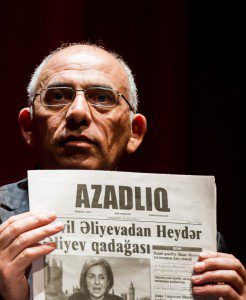
Rahim Haciyev, acting editor-in-chief of 2014 Index on Censorship Freedom of Expression Journalism Award-winning Azerbaijani newspaper Azadliq (Photo: Alex Brenner for Index on Censorship)
Civil, political and human rights are harshly restricted and frequently violated in Azerbaijan. Independent and critical journalists frequently find themselves — or their families — targeted.
Rahim Haciyev, acting editor in chief of the Index Award-winning independent newspaper Azadliq, was forced to flee Azerbaijan after years of official harassment. The government has repeatedly cracked-down on dissent.
Haciyev wrote to Index on Censorship from exile in a western European country:
I’m very sorry that the repressive policy of the Azerbaijani authorities against the Azadliq newspaper forced me to leave the country.
After the arrest of the newspaper’s financial director Faig Amirli, the authorities soon stopped issuing a print version. Amirli was arrested on obviously fabricated charges. I was summoned several times to the prosecutor’s office several times to testify about the paper’s financial affairs. The prosecutors said that this was connected with the criminal case of Amirli, but are invesitgating him under charges of “inciting religious hatred” and “violating the rights of citizens under the pretext of conducting religious rights”.
It turned out that they were interested in the financial issues of the newspaper in order to find a way to silence it. In addition, several employees of the newspaper were summoned for questioning. Then a court ordered tax authorities to comb through the paper’s financial activities. It’s clear that this was undertaken to increase pressure on the newspaper and me personally.
Aiming to cripple Azadliq, the government-owned distribution company was ordered to withhold circulation receipts — $84,000. So we weren’t able to print or even pay our bills. Three staffers are in prison — Seymur Hezi, Faig Amirli and Elchin. Each of them had sharply criticised the lawlessness and corruption of Azerbaijani officials.
In February, 11 Azadliq employees were summoned to the prosecutor’s offices to be interrogated again. Several government agencies increased their pressure on the newspaper’s online operation.
I had been warned twice in the past two years by the prosecutor general’s office that under my leadership Azadliq had been slandering Azerbaijani authorities. In their notices I was told that failure to comply with their terms would mean legal repercussions for me. But I refused. The newspaper continued to report on corruption, abuses of power and the absence of the rule of law. We were devoted to pursuing the truth.
And that is why the authorities intensified repression against the newspaper. Now this lawlessness has forced me to leave the country.
This decision was extremely difficult. I am cut off from my family and friends. I have two children and don’t know when I will see them again.
But despite all the problems I will continue to work daily for the newspaper’s website.
It’s my job, this is my job, this is my life.
Rahim Haciyev
Acting Editor-in-Chief, Azadliq
Haciyev is just one of the many journalists who have been targeted by Azerbaijani authorities in recent years. The country is ranked 163rd out of 180 countries in RSF’s 2016 World Press Freedom Index, which ranks 180 countries according to the level of freedom available to journalists. Almost everyone who speaks out against the regime of President Ilham Aliyev, including journalists, human rights defenders, activists and bloggers, are commonly imprisoned on spurious charges, such as drug and weapon possession, hooliganism and tax evasion. Reports of torture and abuse are typical by those being detained. At least 15 Azerbaijani prisoners of conscience currently remain in jail, including:[/vc_column_text][/vc_column][/vc_row][vc_row][vc_column width=”1/2″][vc_column_text]

Mehman Huseynov (Twitter)
Mehman Huseynov, an Azerbaijani journalist and pro-opposition blogger, was sentenced to two years in jail on 3 March by a Baku court for defaming the police chief of the city’s Nasimi district. Huseynov intends to appeal his sentencing. According to Front Line Defenders, a group of police officers violently attacked Huseynov on 9 January. The next he was brought to court, found guilty of disobeying police orders and fined 200 manat (£96). [/vc_column_text][/vc_column][vc_column width=”1/2″][vc_column_text]
Founder and editor of online news portal Kend.info Elchin Ismayilli was arrested on 17 February on charges of “extorting money” and “aggravated abuse of a position of influence”. According to the Caucasian Knot, he was also accused of blackmailing a local office, charges he insists were fabricated to silence his coverage of local corruption and human rights violations. On 18 February, Ismayilli was sentenced to a pre-trial detention period of 24 days. He has previously been subject to multiple arrests and cases of harassment related to his work as a journalist.[/vc_column_text][/vc_column][/vc_row][vc_row][vc_column width=”1/2″][vc_column_text]
On 3 March, a court decided to prolong the period of investigation of Faig Amirli for three months, the Azerbaijan Press Agency reported. Amirli, financial director of newspaper and assistant chairman of the Azerbaijani Popular Front Party (APFP), was arrested on 20 August 2016 for “inciting religious hatred” and “violating the rights of citizens under the pretext of conducting religious rights,” according to Radio Free Europe/Radio Liberty.[/vc_column_text][/vc_column][vc_column width=”1/2″][vc_column_text]
Writer and blogger Rashad Ramazanov was arrested on 9 May 2013 and sentenced to nine years in prison. According to English PEN, his charges included “illegal possession and sale of drugs”. Police claimed to have found nine grams of heroin on his body, although Ramazanov insists that the drugs were planted by the officers, who he claims also beat him up and tortured him during interrogation. Ramazanov was sentenced to nine years in prison in November 2013 on a trumped-up drug trafficking charge. PEN International reported that on 23 January Ramazanov was moved to solitary confinement for 15 days, the reason for which remains unknown. On 7 February Ramazanov was released from solitary confinement, and his family was given permission to visit him.[/vc_column_text][/vc_column][/vc_row][vc_row][vc_column width=”1/2″][vc_column_text]
Founder and editor of the website Azel, Afgan Sadygov, was sentenced on 12 January to 2.5 years in jail. Sadygov was arrested on 22 November 2016 based on accusations of “hooliganism” after he was attacked on 9 August 2016 and allegedly hit a woman, Contact Online news reported. Sadygov’s website often reports on issues such as poor infrastructure maintenance, bad quality of roads and waste of public funds in Azerbaijan’s Jalilabad region.[/vc_column_text][/vc_column][vc_column width=”1/2″][vc_column_text]
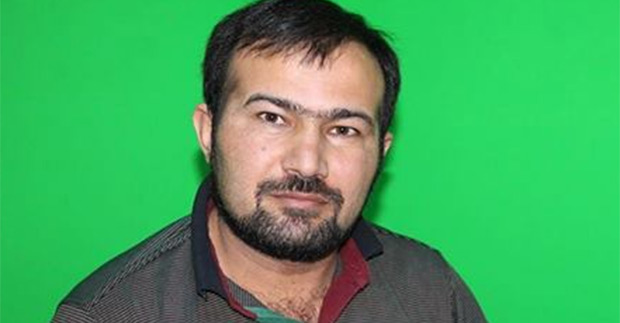
Seymur Hezi
According to MeydanTV, the Supreme Court will hear the appeal of Seymur Hezi, reporter for opposition news source Azadliq and presenter for critical TV program “Azerbaycan Saati” on 13 April. The journalist was sentenced to five years in prison on 29 January 2015 on a trumped-up charge of aggravated hooliganism, Index on Censorship reported. The charge came after Hezi was attacked on 29 August by Maherram Hasanov, a complete stranger, and defended himself. Hezi has accused President Ilham Aliyev and chief of staff Ramiz Mehdyev of ordering his arrest.[/vc_column_text][/vc_column][/vc_row][vc_row][vc_column width=”1/2″][vc_column_text]
The lawyer of Nijat Aliyev, former chief editor of religious website Azadxeber.org, has not been able to get hold of the text of the verdict of the Supreme Court of Azerbaijan for his client, Contact Online news reported. Aliyev’s lawyer believes that the delay has been intentional in order to prevent the filing of a complaint with the European Court of Human Rights, Contact Online news reported. According to IRFS, Aliyev was detained on 20 May 2012 and sentenced to 10 years in prison on 9 December 2013 on charges of illegal possession of drugs and weapons, incitement of religious hatred, calls to seize power and distributing banned religious literature. Aliyev’s website previously published criticisms of the government’s policies in regards to religion, the possibility of a LGBT parade in Baku and the allotment of too much funding for the Eurovision Song Contest in 2012, OCCRP reported.[/vc_column_text][/vc_column][vc_column width=”1/2″][vc_column_text]
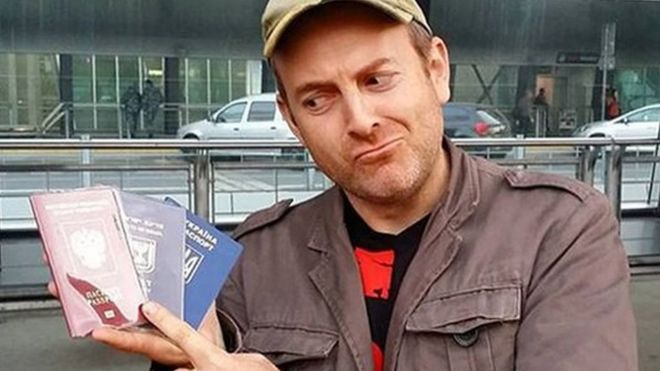
Alexander Lapshin (BBC)
Russian-Israeli travel blogger Alexander Lapshin was extradited from Belarus to Azerbaijan on 7 February. He faces up to five years in prison on charges of “public calls against the state” and “unauthorised crossing of borders,” according to Armenian News Agency ArmenPress. These charges came after Lapshin traveled to the disputed territory of Nagorno-Karabakh and sympathised in his blog entries with the Armenians he met, GlobalResearch reported. [/vc_column_text][/vc_column][/vc_row][vc_row][vc_column width=”1/2″][vc_column_text]
Fikrat Faramazoglu, editor-in-chief of news website jam.az, has been detained since 30 June 2016 on the charge of extortion by means of threats, which is punishable by up to five years in prison. According to Azerbaijan Free Expression Platform, these charges originated when a local restaurant owner accused Faramazoglu of extorting money from him when asked to remove defamatory articles about the restaurant on websites owned by the journalist.[/vc_column_text][/vc_column][vc_column width=”1/2″][vc_column_text]
Blogger and social media activist Abdul Abilov has been imprisoned since 22 November 2013. According to Azerbaijan Free Expression Platform, Abilov was charged with illegal possession, storage and manufacturing or sale of drugs when authorities claim to have found illegal drugs in his home and on his person, which Abilov continues to protest were planted on him. On 27 May 2014 Abilov was sentenced to five-and-a-half years in prison. Stop Sycophants!, the Facebook page previously run by Abilov, was shut down following his arrest, IRFS reported. The page was known to strongly criticise authorities.[/vc_column_text][/vc_column][/vc_row]
30 Jan 2017 | Azerbaijan, Azerbaijan Letters, Campaigns, Campaigns -- Featured
[vc_row][vc_column][vc_column_text]

Ilgar Mammadov
Azerbaijani opposition politician Ilgar Mammadov was jailed in 2013. The European Court of Human Rights (ECHR) ruled in May 2014 that Mammadov’s arrest and continued detention was in retaliation for criticising the country’s government.
Mammadov is a leader of the Republican Alternative Movement (REAL), which he launched in 2009, and is one of Azerbaijan’s rare dissenting political voices. He was sentenced to seven years in prison after participating in an anti-government protest rally in Ismayilli, a town 200 kilometers outside Baku. Authorities arrested him on trumped-up charges of inciting the protest with the use of violence. Mammadov had previously announced his intent to run for president. Mammadov remains in jail, despite the Council of Europe repeatedly calling for his release. Azerbaijan may be expelled from the council as the country repeatedly refuses to comply with the organization’s requests. John Kirby, spokesman of the US Department of State, also called on Azerbaijan to drop all charges against Mammadov. Reports in November 2015 emerged stating that Mammadov had been tortured by prison officials, which resulted in serious injuries including broken teeth. Mammadov has remained very vocal during his time in jail, writing on his blog about political developments in Azerbaijan and refusing to write a letter asking for pardon from President Ilham Aliyev.
The following is a letter written by Ilgar Mammadov:
International investment in fossil fuel extraction is making me and other Azerbaijani political prisoners hostages to the Aliyev regime.
A thirst for freedom.
Azerbaijan has seen a crackdown on any political dissent over the past few years, with dozens of activists and critics of the regime in Baku going behind bars. So far, there’s little sign of improvement.
Though respectful of the memory of Nelson Mandela, the mass media have occasionally shed light on the late South African leader’s warm relationship with scoundrels such as Muammar Qaddafi and Fidel Castro, as well as his refusal to defend Chinese dissidents. These events have been evoked to invite critical thinking about an iconic figure and balance his place in history.
Most readers of these articles judge a figure they previously held as an idol as hypocritical or tainted. They do not ask questions about the roots of a particular contradiction. In the case of Mandela, the dictators above had supported the anti-apartheid struggle of the African National Congress, while several established democracies indulged the inhuman system of apartheid because of the diamond, oil and other industries, and particularly because of the Cold War.
After only four years in prison, even on bogus charges and a politically motivated sentence, I am nowhere near Mandela in terms of symbolising a cause of global significance. Republicanism in my country, Azerbaijan — where the internationally promoted father-to-son succession of absolute power has disillusioned millions — is hardly comparable to the fight against racial segregation. Still, I can, better than many others, explain the flawed international attitudes that help keep democrats locked in the prisons of the “clever autocrats” who are, in turn, courted by retrograde forces within today’s democracies.
I will tell the story of how plans for a giant pipeline that would suck gas from Azerbaijan to Italy, the Southern Gas Corridor (SGC), impacts on Azerbaijan’s political prisoners.
In this letter I will focus only on one tension of the struggle we face here in Azerbaijan — between our democratic aspirations that enjoy only a nominal solidarity abroad, and the attempt to build a de facto monarchy which receives comprehensive support from foreign interest groups.
To be precise, I will tell the story of how plans for a giant pipeline that would suck gas from Azerbaijan to Italy, the Southern Gas Corridor (SGC), impacts on Azerbaijan’s political prisoners.
I will tell the story by discussing my own case. But before I tell it, you need to know what the Southern Gas Corridor is and why my release is crucial for the morale of our democratic forces. Indeed, Council of Europe officials say my freedom is essential for the entire architecture of protection under the European Convention of Human Rights, but there is still no punishment of my jailer.
What is the Southern Gas Corridor?
The Southern Gas Corridor is a multinational piece of gas infrastructure worth $43 billion US dollars. It is designed to extract and pump 16 billion cubic metres of natural gas every year from 2018, sucking hydrocarbons from Azerbaijan’s Shah Deniz gas field to European and Turkish markets. The EU, Turkey, and the US are all eager to connect the pipeline to Turkmenistan so that to an extra 20-30 billion cubic metres of Turkmen gas can be added to the scheme.
Hydrocarbon extraction is the mainstay of the country’s economy. Baku signed the “contract of the century” in 1994, and has attracted western oil and gas giants ever since.
The significance of the SGC is twofold. First, the project could provide up to 8-10% of EU’s gas imports, thus reducing the union’s dependence on Russia. Secondly, it will become another platform for geopolitical access (Russians would use a slightly ominous word “penetration”) of the west to Central Asia.
How did SGC encourage more repression?
Any rational democratic government in Baku would opt for the SGC without much debate and then turn its attention to issues truly important for Azerbaijan’s sustainable economic development. The revenue generated by the project would not be viewed as vital for the country when compared to the country’s economic potential in a less monopolised and more competition-based economy.
However, since the moment when a Russian government plane took Ilham Aliyev’s barely breathing father from a Turkish military hospital to the best clinic in America, in order to smooth the transition of power, the absolute ruler of Azerbaijan has been trained to deal with great powers first and then use such deals to repress domestic political dissent second. He has kept the country’s economy almost exclusively based on selling oil and gas and importing everything else.
Recently, Aliyev has been trying to present the SGC as his generous gift to the west so that governments will not talk about human rights and democracy in Azerbaijan. At one point Aliyev was even considering unilaterally funding the entire project.
Since 2013, Aliyev has instigated an unprecedented wave of attacks on civil society, which he used to illustrate the seriousness of his ambition for energy cooperation with the west.
In the middle of this tug of war, Azerbaijan suddenly found itself short of money due to falling oil prices. It could not fund its share in the parts of SGC that ran through Turkey (TANAP) and Greece, Albania and Italy (TAP) without backing from four leading international financial institutions — the European Bank for Reconstruction and Development, European Investment Bank, World Bank and Asian Development Bank.
During 2016, these institutions said their backing was subject to Azerbaijan’s compliance with the Extractive Industry Transparency Initiative (EITI). In September, Riccardo Puliti, director on energy and natural resources at the EBRD, cited the resumption of the EITI membership of Azerbaijan as “the main factor” for the prospect of approval of funds for TANAP/TAP.
Together with EIB, EBRD wants to cover US $2.16 billion out of the total US $8.6 billion cost of the TANAP. TAP will cost US $6.2 billion.
What is the Extractive Industry Transparency Initiative?
The EITI is a joint global initiative of governments, extractive industries, and local and international civil society organisations that aims, inter alia, to verify the amount of natural resources extracted by (mostly international) corporations and how much of the latters’ revenue is shared with host states. Its purpose, in that respect, is to safeguard transnational businesses from future claims that they have ransacked a developing nation — for instance, by sponsoring a political regime unfriendly to civil society and principle freedoms.
In April 2015, because of the unprecedented crackdown on civil society during 2013-2014, the EITI Board lowered the status of Azerbaijan in the initiative from “member” to “candidate”. This move, alongside falling oil prices, complicated funding for the Southern Gas Corridor. International backers were reluctant to be associated with the poor ethics of implementing energy projects in a country where already fragmented liberties were degenerating even further.
Hence, during 2016, several governments, especially the US, put strong political pressure on Azerbaijan. This resulted in a minor retreat by the dictatorship. Some interest groups claimed at the EITI board that this was “progress”.
The EITI board assembled on 25 October to review Azerbaijan’s situation. I appealed to the board ahead of its meeting.
Why did my appeal matter?
My appeal was heard primarily because, until I was arrested in March 2013, I was a member of the Advisory Board of what is now the Natural Resource Governance Institute (NRGI), a key international civil society segment of EITI.
In addition to my status within the EITI, the circumstances of my case — which was unusually embarrassing for the authorities — also played a role:
i) The European Court of Human Rights (ECHR) had established that the true reason behind the 12 court decisions (by a total of 19 judges) for my arrest and continued detention was the wish of the authorities “to silence me” for criticising the government;
ii) The US embassy in Azerbaijan had spent an immense amount of man-hours observing all 30 sessions of my trial during five months in a remote town and concluded: “the verdict was not based on evidence, and was politically motivated”;
iii) The European Parliament’s June 2013 resolution, which carried my name in its title, had called for my immediate and unconditional release — a call reiterated in the next two EP resolutions of 2014 and 2015 on human rights situation in Azerbaijan;
iv) Since December 2014, the Committee of Ministers of the Council of Europe had adopted eight (now nine) resolutions and decisions specifically on my case whereby it insisted on urgent release in line with the ECHR judgment.
Due to an onslaught by civil society partners during the 25 October debate, the EITI Board refused to return Azerbaijan its “member” status.
Indecision in America
I am very much obliged to the US embassy for conducting the hard labour of trial observation, but the US government representative’s stance at the EITI board meeting in October was a surprising disappointment.
Mary Warlick, the representative of the US government, insisted that Azerbaijan has made progress worth of being rewarded by EITI membership. Obviously, she was speaking for that part of the US government that wants the SGC pipeline to be built at any cost to our freedom.
A month later, in a counter-balancing act, John Kirby, spokesman of the US Department of State, called on Azerbaijan to drop all charges against me.
Samantha Power’s Facebook posting of my family photo on 10 December, the International day of Human Rights, was also touching. Power is US Permanent Representative at UN. Two years ago, she already mentioned my case in the EITI context at a conference.
Complementing her kindness, around the same time Christopher Smith, Chairman of the Helsinki Commission of the US Congress, in an interview about fresh draconian laws restricting free speech in Azerbaijan, repeated his one year old call for my release.
Yet, on 15 December, Amos Hochstein, US State Department’s Special Envoy on Energy, assured the authorities in Baku that “regardless of any political changes, the US will remain committed to its obligations under the SGC”.
Indecision in Europe
I could set out a similar pattern of European hesitation beginning with my first days in jail.
To be concise, though, let me recall only the fact that on 20 September (the same day that Rodrigo Duterte called the European Parliament “hypocritical” for its criticism of the extra-judicial executions in Philippines), a conciliatory delegation of the EP in Baku not only agreed to hear a lecture from Ilham Aliyev on “[EP] President Martin Schultz and his deputy Lubarek being enemies of the people of Azerbaijan”, but even praised the lecture as a “constructive one”, in the words of Sajjad Karim, the British MEP who had led the delegation.
Political prisoners of Azerbaijan are not worth the amount of money involved in the SGC, but European values probably are.
The aforementioned three resolutions of the European Parliament were thus crossed out as I observed from behind bars.
Two presidents of the Parliamentary Assembly of the Council Of Europe (PACE) have visited me in prison, but this only highlighted the irrelevance of the body to the situation on the ground. They never stopped talking of how constructive or how ongoing their dialogue with the Azerbaijani authorities has been.
New threats
Our narrow win at the EITI Board exposes us to two new threats. (I do not discuss here the extraneous threats, which may originate from, for example, rising oil prices or collapse of the nuclear deal with Iran, i.e. anything adding confidence or bargaining power to the regime in Baku.)
One is that at the next EITI board meeting in March 2017, those driven by pressing commodity and geopolitical interests may outnumber or otherwise outpower the civil society party. If Ilham Aliyev proceeds with his cosmetic, fig leaf “reforms” or releases those political prisoners who have already pleaded for pardon or surrendered in any other way, the probability of my freedom being sacrificed will arise again.
The other threat is that instead of battling at the EITI, those interest groups may ask the international financial institutions to disconnect the SGC loans from Azerbaijan’s compliance with the EITI. These institutions are easier to convince as they are full of short-termist bank executives, rather than civil society activists concerned with the rule of law, transparency and public accountability.
The second scenario may already be in effect as rumours suggest that the World Bank has endorsed a US $800m loan to the TANAP. If so, then the postponed energy consultations between Baku and Brussels at the end of January may put the loans back on the EITI-friendly track. Political prisoners of Azerbaijan are not worth of the amount of money involved in the SGC, but European values probably are.
Deep jail horizon
Of 11 other members of the ruling body of my civic movement, REAL, three had to flee the country after my arrest, two were jailed (for 1.5 years and one month on charges not related to my case), two are not permitted to travel abroad (again on separate cases); one of them cannot even leave Baku.
From time to time, activists spend days under administrative detention designed to scare others. Nonetheless, we live in a world different from the one which tolerated and even fed apartheid.
Mandela’s fight promoted an agenda and international institutions where we can defend the values of freedom from encroachment by dictators and their business partners. This is why we should not consider the means of resisting oppression or seeking solidarity with other international arrangements any less conventional now. The problem is that when others see that our peaceful efforts are not fruitful, they turn to more radical means to end injustice.
*Mary Warlick is married to James Warlick, US co-chair of the OSCE Minsk Group mediating in the conflict between Armenia and Azerbaijan over Nagorno-Karabakh. Therefore, initially I guessed that by being nice to the regime she might have tried to make her husband’s relations with the official Baku easier. But in mid-November, James Warlick announced his resignation from the post, apparently as he had planned, and my guess turned out to be mistaken.[/vc_column_text][/vc_column][/vc_row][vc_row][vc_column][vc_basic_grid post_type=”post” max_items=”4″ element_width=”6″ grid_id=”vc_gid:1485781328870-cb0adaa0-0682-7″ taxonomies=”7145″][/vc_column][/vc_row]




